

Zamia Speech.
Language model toolkit. HTK. Wave2letter. Kaldi. Welcome to SIDEKIT for diarization documentation! — s4d 0.1.0 documentation. LIUM Speaker Diarization Wiki [welcome] Welcome This wiki presents the LIUM_SpkDiarization tools.
![LIUM Speaker Diarization Wiki [welcome]](http://cdn.pearltrees.com/s/pic/th/speaker-diarization-welcome-78864414)
LIUM_SpkDiarization is a software dedicated to speaker diarization (ie speaker segmentation and clustering). It is written in Java, and includes the most recent developments in the domain. LIUM_SpkDiarization comprises a full set of tools to create a complete system for speaker diarization, going from the audio signal to speaker clustering based on the CLR/NCLR metrics. These tools include MFCC computation, speech/non-speech detection, and speaker diarization methods. This toolkit was developed for the French ESTER2 evaluation campaign, where it obtained the best results for the task of speaker diarization of broadcast news in 2008[1]. Some related publications If you are using this toolkit in your research please cite one of these papers. Speaker Diarization M. Toolkit-interspeech2013.pdf S. Diarization-cmu-spud-2010.pdf Speaker Identification V. 1.a S. Machine Learning & Open Source Speech-to-text Engine Development Project.
Open Source Toolkits for Speech Recognition. List of speech recognition software. Top 5 Open Source Speech Recognition Toolkits. As we mentioned in our last blog post, the speech recognition market is forecasted to grow from about $3.7 billion a year to about $10 billion a year by 2022.
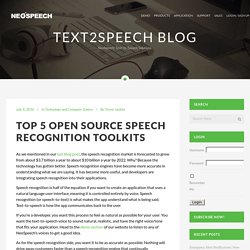
Why? Because the technology has gotten better. Speech recognition engines have become more accurate in understanding what we are saying. It has become more useful, and developers are integrating speech recognition into their applications. Speech recognition is half of the equation if you want to create an application that uses a natural language user interface, meaning it is controlled entirely by voice. If you’re a developer, you want this process to feel as natural as possible for your user. About CMUSphinx – CMUSphinx Open Source Speech Recognition. CMUSphinx collects over 20 years of the CMU research.
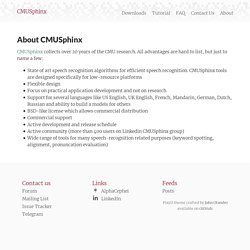
All advantages are hard to list, but just to name a few: State of art speech recognition algorithms for efficient speech recognition. CMUSphinx tools are designed specifically for low-resource platforms Flexible design Focus on practical application development and not on research Support for several languages like US English, UK English, French, Mandarin, German, Dutch, Russian and ability to build a models for others BSD-like license which allows commercial distribution Commercial support Active development and release schedule Active community (more than 400 users on Linkedin CMUSphinx group) Wide range of tools for many speech-recognition related purposes (keyword spotting, alignment, pronuncation evaluation)
WebHome < GRM < TWiki. OpenGrm is a collection of open-source libraries for constructing, combining, applying and searching formal grammars and related representations including: NGram Library: makes and modifies n-gram language models encoded as weighted finite-state transducers (FSTs), Thrax Grammar Compiler: compiles grammars expressed as regular expressions and context-dependent rewrite rules into weighted finite-state transducers.
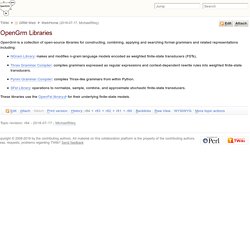
Pynini Grammar Compiler: compiles Thrax-like grammars from within Python. SFst Library: operations to normalize, sample, combine, and approximate stochastic finite-state transducers. STAR Laboratory: SRI Language Modeling Toolkit. SRILM is a toolkit for building and applying statistical language models (LMs), primarily for use in speech recognition, statistical tagging and segmentation, and machine translation.
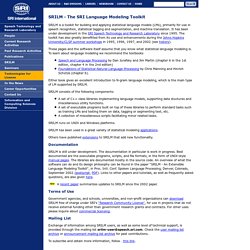
It has been under development in the SRI Speech Technology and Research Laboratory since 1995. The toolkit has also greatly benefitted from its use and enhancements during the Johns Hopkins University/CLSP summer workshops in 1995, 1996, 1997, and 2002 (see history). These pages and the software itself assume that you know what statistical language modeling is.
To learn about language modeling we recommend the textbooks Either book gives an excellent introduction to N-gram language modeling, which is the main type of LM supported by SRILM. SRILM consists of the following components: A set of C++ class libraries implementing language models, supporting data stuctures and miscellaneous utility functions. SRILM runs on UNIX and Windows platforms. Praat: doing Phonetics by Computer. How Could You Use a Speech Interface? Last month in San Francisco, my colleagues at Mozilla took to the streets to collect samples of spoken English from passers-by.
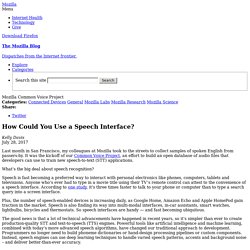
It was the kickoff of our Common Voice Project, an effort to build an open database of audio files that developers can use to train new speech-to-text (STT) applications. What’s the big deal about speech recognition? Speech is fast becoming a preferred way to interact with personal electronics like phones, computers, tablets and televisions. Anyone who’s ever had to type in a movie title using their TV’s remote control can attest to the convenience of a speech interface. According to one study, it’s three times faster to talk to your phone or computer than to type a search query into a screen interface. Plus, the number of speech-enabled devices is increasing daily, as Google Home, Amazon Echo and Apple HomePod gain traction in the market. The Innovation Penalty There are barriers to open innovation, however.
Common Voice et Deep Speech : les projets de Mozilla pour développer des solutions de reconnaissance vocale. Google, Alexa, Siri… Les assistants vocaux des plus grandes entreprises de la tech se positionnent comme les ambassadeurs du marché.

Dans une telle configuration, il est difficile pour tout nouvel acteur de trouver sa place. Sauf si ce dernier s’engage à un traitement plus éthique de la voix, des données collectées et se donne pour mission de favoriser l’accessibilité. C’est ce que propose Mozilla, avec son projet Common Voice et sa technologie Deep Speech. La firme a l’ambition d’offrir une solution ouverte et moins coûteuse à tous ceux qui souhaitent développer des produits de reconnaissance vocale. En marge de la Digital Tech Conference de ce 30 novembre à Rennes, nous avons interrogé Kelly Davis, chercheur en machine learning chez Mozilla, pour en savoir plus sur les projet du groupe.
CMUSphinx Open Source Speech Recognition. : autoEdit. Open-Source Large Vocabulary CSR Engine Julius. About Simon. Machine Learning & Open Source Speech-to-text Engine Development Project.